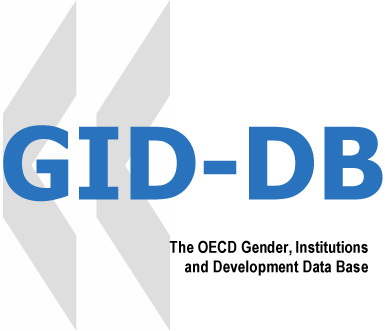Gender, Institutions and Development Data Base
 The OECD Gender, Institutions and Development Data Base is a tool to determine and analyse obstacles to women’s social and economic development. The data base, which was introduced by the Organisation for Economic Co-operation and Development Organisation for Economic Co-operation and Development Development Centre on International Women's Day 2006, covers a total of 160 countries and comprises an array of 60 indicators on gender discrimination.
The OECD Gender, Institutions and Development Data Base is a tool to determine and analyse obstacles to women’s social and economic development. The data base, which was introduced by the Organisation for Economic Co-operation and Development Organisation for Economic Co-operation and Development Development Centre on International Women's Day 2006, covers a total of 160 countries and comprises an array of 60 indicators on gender discrimination.
Data Base Composition
The data base is structured around key building blocks of gender equality, including “Access to Resources such as Education and Health”, “Political Empowerment of Women” and “Women’s Economic Status”. The GID-DB also contains information on “Social Institutions” such as cultural practices and social norms that affect gender equality. By providing information on these hidden instances of gender discrimination, the data base complements existing data compilations such as the United NationsDP Human Development Report, the World Bank‘s GenderStats or the Gender Gap Report by the World Economic Forum .
Measures of Social Institutions
The GID data base structures social institutions into following categories:
- Family Code, including information on marriage customs and decision-making power within a household.
- Physical Integrity, capturing violence against women through traditional practices such as female genital mutilation or other attacks (e.g. rape, assault, harassment).
- Civil Liberties, measuring the extent to which women can participate in social life (e.g. moving freely in public without the obligation to wear a veil or be escorted by male relatives).
- Ownership Rights, indicating the quality of women’s access to property, either in the form of bank loans, land, or other material assets.
Information on cultural and traditional practices that impact on gender equality is coded between 0 (indicating equality) and 1 (indicating high inequality) depending on the extent of discrimination and the size of the female population that suffers from the application of a specific social institution. For example, if 20 per cent of the female population in a country report restricted access to inheritance (e.g. as a rule, daughters only get half the amount granted to sons), the variable for inheritance would be 0.10 (20 per cent * 0.50).
Composite Indicator of Gender Equality
Based on the social institutions indicators, the Organisation for Economic Co-operation and Development Organisation for Economic Co-operation and Development Development Centre also introduced a Composite indicator of gender equality: the 2009 Social Institutions and Gender Index (SIGI). Given its exclusive focus on social institutions, the SIGI is a highly specialised measure of gender equality and should not be confused with comprehensive measures such as the Gender-related Development Index or the Gender Empowerment Measure .
See also
- Organisation for Economic Co-operation and Development Organisation for Economic Co-operation and Development Development Centre
- Category:Health
- Gender, Institutions and Development Data Base Variables: Composite indicators
- Gender, Institutions and Development Data Base Variables: School Enrolment
External links
- OECD Gender, Institutions and Development Data Base on OECD.Stat
- OECD Podcast on the GID Data Base http://viphttp.yacast.net/viewontv/ocde/gender_database.mp3
- Gender Equality as Smart Economics – A New World Bank Group Action Plan, at the World Bank “Gender and Development” site.
- Gender Statistics – at the Social Institutions and Gender Index official site


